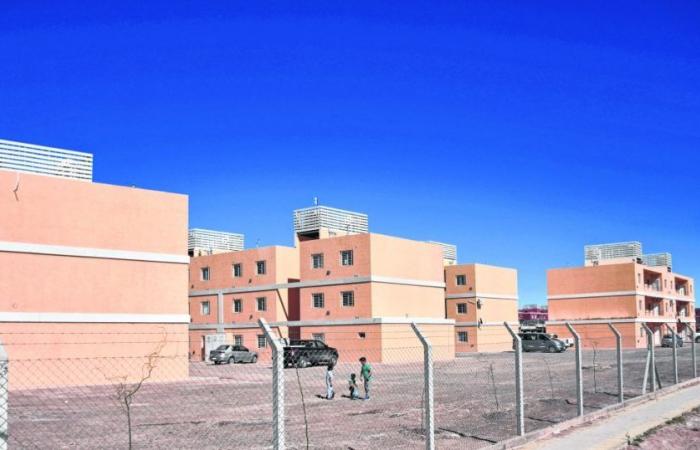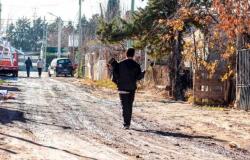The project presented by the Minister of Infrastructure, Rubén Etcheverry, by which the program is created “housing sustainability“In order to establish the valuation and financing of housing, it gave rise to a rich discussion in the Constitutional Affairs commission of the Legislature in which details of the housing situation were known.
Deputy Marcelo Bermúdez (Pro) described that the project seeks to generate a debt collection tool that exist in the homes of the Provincial Institute of Housing and Urban Planning, IPVU (builds houses) and the Sustainable Urban Development Agency, ADUS (provides financing). He noted that, in the history of the Province, some 58,000 homes have been built and delivered, of which 17% have been cancelled, roughly 10,000 units. There are about 48,000 left to cancel, of which 5,000 are in a regular situation, They have been paying their fees regularly, and some 43,000 have not received payment.
The legislator said that of this last figure, more or less half are strictly in arrears and the others did not even collect.for different reasons that in my opinion are not justifying but obviously hindered the collection such as the lack of measurement and the end of the work”. He clarified that they are not justifications because beyond the absence of these procedures, the homes are occupied.
He argued that it results iIt is imperative to normalize the situation to generate resources to continue providing housing solutions.
The law creates a registry of people who have been beneficiaries of these plans and causes, in the case of default of three consecutive or five alternate installments, the expiration of the plans. “The consequence is, in the case of the IPVU, the collapse of the contract and the novation of the debt: there is an appraisal by the Appraisal Court of the square meter that is multiplied by the square meter of the house, which is divided by the value of the UVI, Housing Unit, which is announced by the Central Bank on a daily basis,” he explained.
He indicated that this amount is the new value of the house, a new installment value and a new maximum term of 240 months. He noted that there are plans for up to 80 years with installments of $150 pesos per month.
He concluded that heThe person who pays the fee remains unchanged and whoever falls into default has to face this change in assessmentdebt change, change in quota value and term.
In the case of the ADUS, he asked to analyze the wording because it is contemplated that if the debt falls, the amount borrowed is required, there is no exit as in the case of the IPVU. “H.We must put the two situations on an equal footing and, in the event of a fall in debt, renegotiate the terms and prices,” he said.
He added that the project creates a housing debt-free certificate. The State, in any contract it makes with natural persons, will request this free debt to contract.
“The objective is absolutely reasonable and the initiative should be supported beyond contributions to the editorial team,” he stated.
The MPN emphasizes the social issue
Deputy Gabriel Álamo (MPN) highlighted the need to develop a state investment recovery modality although he warned that “there has to be a strong axis in the socioeconomic issue of families because not all have the same conditions to pay.” He admitted that “this irresponsibility of paying for housing is incorporated, which is very naturalized” and explained that “it is essential that there is recovery because in this way new homes can be built.”
He insisted that “it is necessary to review each case and the income and payment possibilities of each family.”
Guillermo Monzani (We do Neuquén) He described that Álamo’s warnings were incorporated in two articles of the project that the Executive sent in relation to the fact that the quota cannot exceed 30% of the family income and also about the vulnerability of families.
“Obviously we know that the system, as it is, does not work and we see the absurdity of some fees in some plans that are $200 and in other neighborhoods, a little more affluent, they pay between $2,500 and $3,000,” he said.
He recalled that in the plan for 570 homes that was carried out in the municipal efforts of the late Horacio Quiroga (UCR) $2,200 is paid for “half a package of weed.”
He questioned whether it is necessary to charge the free debt to the driver’s license that today already has that of late payments, food debtor and taxes.
“The system does not work like this, much less the chain to later be able to build more housing,” he stated and quoted the deputy Mercedes Tulián (Pro) in that the same tax on fuel includes 18.9% that goes to housing, which “It seems like a lost fund because what is collected”.
He exemplified that in the case of a group of 100 homes, with current values, half a home can be recovered to dimension the issue towards a virtuous circle.
Claudio Dominguez (MPN) clarified that since the homes are listed in the name of the ADUS and the IPVU “real estate tax cannot be charged” and “nor do municipal services such as waste collection.”
He revealed that in the municipalities of Neuquén, Plottier and Centenario Fees cannot be charged because the ADUS and the IPVU do not inform those municipalities who owns the houses “which happens in 80% and a debt is generated that will never be collected and the municipality must provide the servicestart the same.”
He proposed taking this aspect into account because the municipalities do not charge these neighbors and the cost is passed on to the rest of the taxpayers.
There was a debate about the time it takes for the deed to be completed because cooperatives and unions are involved, and then it was proposed that on the day the home is granted, a certificate of eligibility would be provided that would allow for services to be obtained.
They say that many houses are rented
Francisco Lépore (Community) contributed that “if the State cannot recover some of what it invests in housing, it is impossible for it to reinvest” in a province – he pointed out – that has a housing deficit of 100,000 units, which results in settlements. and high rental prices.
He admitted that the State must make investments to address the problem and “in turn reinvest with those same funds in new homes.”
He rescued two articles from the project that mention the authorities that assume the leadership of the powers and the need for them to have the certificationfree housing debt “because it gives the importance that the issue requires.”
He agreed with Bermúdez regarding charging public officials and “perhaps we could expand the articles not only to officials.”
He said that he will ask the IPVU to evaluate the states of vulnerability and in relation to the rental he maintained that “the verification that an ADUS or IPVU home is andRenting should have some implications because although it is prohibited, it is the most common thing in the world.”
He noted that you pay $2,500 for a house that is rented for $700 and $800 thousand per month and “we all know that in Neuquén.” He added that units with tickets are also sold. and although it is prohibited, it should be taken into account in the law in question, that refinancing falls and the home is revalued.
“We could try it again,” he proposed and questioned whether to incorporate the certificate into the driver’s license.
Zulma Reina (Community) He highlighted the government’s fetish verb: reorder. “We need to reorganize, do a survey to see who is there, if the owner is the one who lives in the home or not,” he said and added that those who pay “have to interpret that they are making a solidarity contribution.”
Leaving aside the officials – he maintained – we must see to what extent free debt should be requested from the public employees because they “can take care of a reasonable fee.” He proposed reviewing articles and expressed his agreement with the project in that it is a single home and that the person who is the owner is occupying it.
The money is not executed and the State is stupid
Andrés Blanco (FIT) rescued the interest in the discussion although he assured that the flow of funds will not be immediate to respond to the 100 thousand families who do not have housing who must turn to a cooperative or private developers. He agreed to convene the Housing authorities and incorporated another issue. He said that when the budget is discussed, items are voted for the construction of housing that are then not executed..
Héctor Novoa (Community) highlighted his agreement with the initiative, recognizing that “we are not going to be able to solve the great demand that exists in the Province of Neuquén but it is an important step and thinking about ordering the payment and the deed process.”
He revealed that there are people who canceled the home and that “There is a tangle of bureaucratic impediments that prevent that neighbor from accessing writing.” He stated his agreement with the project and requested reports or requested the presence of Housing authorities.
In that conceptual sequence he indicated that “it is necessary to put an end to the figure of the stupid State, the heavy and indifferent State that certain people, obtaining a benefit, do not respond as they had promised.”








